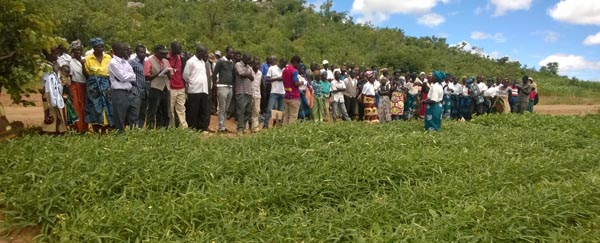In Malawi, N2Africa is working to resolve some of the issues through engaging farmers in trainings and capacity building, field demonstrations and sensitization on new technologies such as the use of rhizobial inoculant. N2Africa is collaborating with Kasungu District Agriculture Development Office (DADO) and Churches Action in Relief and Development (CARD) to conduct training on inoculation, appropriate soil fertility management, integrated pests management and post-harvest practices.
Joseph Chimutu is one of the farmers from Kasungu who has benefited from N2Africa interventions. He was previously harvesting 7 bags of Makwacha soyabean variety from his 1 acre field. N2Africa and CARD came in to support farmers with soyabean seed multiplication program and training on modern soyabean farming and use of inoculants. He is now expecting to harvest 10 bags despite serious drought that hit this season.
"Before N2Africa trained us, our crops were affected by aflatoxin. We didn’t know how to take good care of our legumes after harvest and even from the field," says Chimutu, adding, "this time we have been trained to keep our seed and we hope it will help us that our produce can compete on the market".
Although some of the soyabean varieties are promiscuous and can nodulate with rhizobia present in the soil, N2Africa observed that even these varieties respond strongly to inoculant and that farmers harvest much more when they apply inoculant to their fields. National Coordinator for N2Africa Lloyd Phiphira explained, "We organise different activities such as field days, agriculture fairs and legume food nutrition fairs, which are helping us to be in touch with farmers and guide them where necessary. IITA is a research organization and its approach is research based.
"However we have also taken into consideration nutritional needs of our research in promoting value addition after realizing that there is not much profit in agriculture produces," he said.
The N2Africa project, with its partners, has so far set up 240 demonstration plots in its 7 target districts namely Salima, Kasungu, Dedza, Lilongwe, Mchinji, Ntcheu, and Dowa. These demonstration fields are promoting technologies and interventions around groundnuts, soyabeans, cowpea and common bean varieties.

"We are training farmers in double row planting compared to single row planting of groundnuts and soyabean, it is astounding to see positive response from the farmers and their hope for better harvest following our interventions. Farmers have observed that double row planting lead in increased plant population per unit area and certainly results in increased yield." said Phiphira.
Phiphira explained that the N2Africa project’s mandate of fixing nitrogen in the soil has been well received by farmers as they are the currently facing challenges of land degradation that has led to poor harvest.
"Many farmers are now seeing the importance of applying inoculants to their legume crops, this helps to restore nitrogen to the soil, it is even made better with crop rotation," he said.
But how will N2Africa ensure availability of the inoculant to all farmers?
According to Mr. Phiphira, the project has private-public-partnership whereby a private firm is working hand in hand with the public sector. The N2Africa Project in Malawi has provided technical support to Agri-Input Suppliers Limited (AISL) who are producing, branding and distributing Nitrofix inoculant. This inoculant was produced at Chitedze Research Station by the Department of Agriculture Research Services.
N2Africa is also supporting agricultural commercialization in Malawi by encouraging farmers to diversify and do legume farming. Since 2009 N2Africa has been involved in formulating improved inoculant products and delivery systems as well as building local expertise in each target district. So far N2Africa in Malawi has reached out to over 25,000 farmers in its target areas.
Despite early success indicators, the project has encountered challenges this growing season as farmers grappled with effects of climate change. Malawi experienced one of the worst incidences of flooding in some parts of the country whilst in some areas crops dried due to long dry spells. Salima was the only district among the N2africa impact areas that was not affected by the floods. However, the district was also hit by long dry spells, which saw crops drying before reaching maturity stage. According to the government of Malawi, the estimated crop loss due to the drought is put at 27%. However, one interesting thing is that soyabean and cowpea fields have been less affected by the drought compared to maize and groundnuts.
Lloyd Phiphira and Emmanuel Mwale
